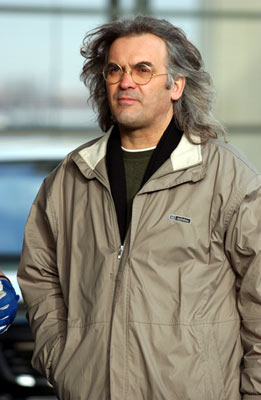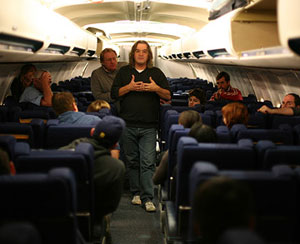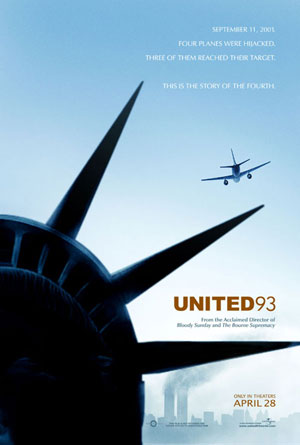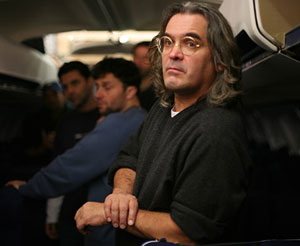 Paul Greengrass was the last person I spoke to on the very long United 93 press day, and I guess that’s fitting. It’s been a long journey, coming from Watchmen to what is turning out to be the most critically acclaimed film of 2006 (and an Oscar frontrunner? It’s going to be interesting to watch how that turns out). Along the way I’ve spent hours on the phone with Paul, and hours in person with him on the Newark Airport location shoot, and I even did a detour and spent some time with him talking for the next issue of Mean Magazine, available at Barnes & Noble and Borders very soon.
Paul Greengrass was the last person I spoke to on the very long United 93 press day, and I guess that’s fitting. It’s been a long journey, coming from Watchmen to what is turning out to be the most critically acclaimed film of 2006 (and an Oscar frontrunner? It’s going to be interesting to watch how that turns out). Along the way I’ve spent hours on the phone with Paul, and hours in person with him on the Newark Airport location shoot, and I even did a detour and spent some time with him talking for the next issue of Mean Magazine, available at Barnes & Noble and Borders very soon.
On this last day Paul was obviously exhausted. He had been working on the film non-stop to this point – even the cut I had seen the day before had been changed (Paul had removed the final bit of text at the end of the movie “America’s war on terror had begun” the text said. I told Paul I thought it was interesting that “war on terror” wasn’t capitalized, and he said that he had cut the whole thing out; he had kept it to help make the film relevant to today and he realized he didn’t need the text for that. Also, he was worried that the final bit of text would divide audiences – the two critics who reviewed that cut (which they weren’t supposed to do) did make mention of the text, so I think he was right). But as always, Paul was voluminous with his thoughts. He’s as smart as anyone I’ve ever interviewed, and with twice as much to say – I guarantee the commentary track on the United 93 DVD will be worth a serious listen.
At the end of the interview Paul told me he’d be back in New York at the end of the summer for The Bourne Ultimatum, which he starts working on in a few days. Hopefully the relationship between CHUD.com and Paul Greengrass continues in the months ahead.
Check out my other one on ones with Paul by clicking here and here.
Q: What is the definition of success for this film? When it’s released, after that first weekend what will you use to judge whether it was successful.
Greengrass: Honestly, truly, I think a number of things. A couple of hurdles it has to get through. Firstly it has to not be rejected by the families.
 Q: Have they all seen it at this point?
Q: Have they all seen it at this point?
Greengrass: They have all seen. Maybe one or two still have to see it. It’s been marked by great, sincere support. We all felt incredibly relieved, because I don’t think you can say it’s an easy film to watch. There’s the fear you’ve pitched it wrong or you’ve upset them. And neither do they all necessarily agree with each other; they’re quite a diverse group of people, with different views about that event. That’s very relieving.
Then the film comes out. I don’t think anybody makes these kinds of films… it’s a different thing than making a commercial film. Nobody involved is doing it for anything other than the love and the feeling this is a film everybody wants to make, including Universal, incidentally. So I guess we would all like the film to be thought to have made a contribution. It sounds sort of loose and sort of a trite thing to say, but that’s honestly the truth of it. What does that mean? I guess it means people think it was worth doing and that it doesn’t get rejected; people do go and see it and find that it works.
But no one is going to be counting the numbers. It’s not that kind of thing.
Having said all that, speaking personally, no matter what it does – and I hope it’s well received and I hope that people go see it – having said that, the experience of making the film is in a sense a bit different from the actual film itself. The experience of making the film from my point of view, and I suspect most people involved, was inspiring and educational and absolutely not to be missed. It was an extraordinary kind of creative privilege to sit in a place for a couple of months with a whole group of people – those families, a group of actors from New York, air traffic controllers, pilots, stewardesses, military guys, people from other parts of the government who investigated this – a diverse group of people who had nothing to do with each other, and not all of whom agreed. But all of whom shared the idea of let’s get together and in this weird way see what comes out of it.
You came out to Newark – it was an amazing kind of… actually now that a little bit of time has gone past, it’s even more amazing. Just the things you learn about. Talking to those four actors who played the hijackers and going with them on that journey into Islam and the tenets of it and the rituals and what it means, all of that, was absolutely fascinating. Learning about the air traffic control system was absolutely fascinating. Looking in detail at the US military and how incredibly difficult it is for them with all their might, with the billions they spend, and how absolutely naked they were on that day. And actually in reality remain, because it’s very, very hard to fight asymmetrical warfare. You realize how fucking difficult it is.
I suppose the sense in the end that you take this one event, 9/11, and at the heart of it this one flight and the proposition of the film is that somehow if you get the story to weave together as a whole you get something that stands for where we were then and where we are today. I used to say to the actors about that last five minutes of the film that somewhere in the course of that we were moving from the events of that day, through time, through today to tomorrow. I used to say to them I can’t tell you where exactly that occurs, but sometime by the time they’re fighting outside the cockpit and they have that guy by the neck and it turns into this terrible, violent scene – that feels like today. And by the time they’re in the cockpit and they’re struggling, it feels like tomorrow. A warning about where we might end up as a world, plummeting to Earth with a fight going on between us and them.
 Q: I had spoken to you extensively during the making of the film, and with other people in the production. Everyone said. ‘We’re not going to be shy about the violence. We’re going to show how violent this hijacking was.’ What nobody mentioned was how violent the end results would be, how brutal the passenger uprising would be as well. What was the decision to go there? Is the film saying that this is the natural reaction to this kind of thing?
Q: I had spoken to you extensively during the making of the film, and with other people in the production. Everyone said. ‘We’re not going to be shy about the violence. We’re going to show how violent this hijacking was.’ What nobody mentioned was how violent the end results would be, how brutal the passenger uprising would be as well. What was the decision to go there? Is the film saying that this is the natural reaction to this kind of thing?
Greengrass: I think that’s what I believe. We’re in a lot of problems at the moment; we really are. There’s a big group of people who say we should never have gone into Iraq, there’s a big group who say we should. I’m talking about your country as well as mine. The whole reaction to 9/11 has been to pitilessly expose our divisions as societies. It’s divided America from Europe, it’s divided America from itself, it’s divided Europe internally, it’s divided Britain – it’s pitilessly exposed all our divisions, this thing. And of course that’s one of the strategies of asymmetrical warfare. You attack the democracy and expose the internal contradictions that otherwise lay dormant. One of the things you hope for is to provoke an authoritarian reaction.
So we’ve got all this stuff going on and my feeling is that if we start the film saying, let’s go back to the common ground – the common ground is that this thing started in those two hours. So let’s try and tell the story of those two hours, and see if it can’t show us something relevant to today. Because it is common ground maybe we’ll all see different things but maybe it will all be common. I think it does show you different things. I think it shows you some really troubling things like, most importantly for me, I think it shows you we went to war inside two hours and we went to war blindly. We never saw the enemy. We certainly didn’t understand him. We went to war in a state of maximum confusion. With maximum violence, ourselves frightened at having sustained an act of unimaginable violence.
You’ve got this world driven by move and countermove. That’s not to condemn the countermove. The natural response to being attacked is to fight back. It’s natural. I hope this film challenges a lot of our kind of cozy nostrums.
Cozy nostrum one: Our response to 9/11 was all got up by Bush and Rumsfeld and Cheney. That can’t be true. You get attacked on an unimaginable scale, you can’t sustain events like 9/11 without responding on some level militarily, otherwise the democracy ceases to function, as one of the prime functions of the state is to protect us all. So then you’re driven into militarizing. You’re just driven to it. By it’s nature – cities being attacked, planes being hijacked. You see it. It’s why we told the story through the air traffic control system. You can see so clearly how the system – which is this magnificent, perfect reflection of all of our… it’s like you were to think of something magnificent our society created, it’s the air traffic control system. You have these planes whizzing about, taking us where we want to go, promoting trade and communication. All of that grounded inside of two hours. The civilian nervous system was down and in its place every warplane in the sky you could get. I’m not being judgmental about it – that’s what happened.
Of course that has consequences. We’d be fooling ourselves if we thought we could sustain a hit like 9/11 and not respond. Then of course all the other choices come on the back of it. If we respond, how. We all know that if you’re conducting asymmetrical warfare you want the superior force to overreact. You want them to make a mistake. You want them to militarize. You want to destroy the very civilian structures. What I’m saying is that anybody who has ever studied societies that experience this kind of violence, like Northern Ireland, you see how that pattern is very hard to escape.
Cozy nostrum two: Flight 93 was shot down. Staggering numbers of people who read your site think it was shot down.
 Q: It drives me nuts.
Q: It drives me nuts.
Greengrass: I have a lot of sympathy for conspiratorial people. What it is is engagement. Its’ a really passionate engagement and curiosity about the world. And it’s a really healthy skepticism about power and who has it and how it’s used. It’s basically asking why, what if, and says who, all of which are fantastically important questions that don’t get asked enough.
But one of the problems with conspiracy theories is that at some point conspiracies are cozy. They are comfort blankets. They say to us you don’t have to really worry about the world because at the end of the day there are a bunch of bad guys with black hats on controlling it all. We’re all being duped. Issues of complexity don’t arise.
But the truth is that doesn’t wash. That isn’t the world we live in. There is a malevolent force, and I do believe it to be malevolent. I am not in favor of all the things fundamentalist jihadists are in favor of. They’re opposed to everything I think progressive politics are about. They’re in favor of violence of the most brutal kind, they’re anti-democratic, they’re anti-gender liberation. They’re nihilistic. They believe in the primacy of religion over rationality. On any issue you can think of I am totally opposed to them, and I think they are totally opposed to all progressive politics and will destroy it if they can. That’s the problem – if you’re progressive minded, what do you do about that? You have to do something. Pretending that they’ll go away or hoping they’ll go away isn’t going to achieve anything. On the contrary, it’s going to threaten. But how? How do we do it? It isn’t as easy as ‘let’s get them before they get us.’ That isn’t going to achieve it either. One of the things that I think is in this film if you look at it is you get to the point where you see the stark choices of our world: do nothing and hope for the best, which doesn’t wash and get them before they get us, which didn’t work. Somehow out of this whole problem we’ve got to develop the language and vision to create a viable choice out of this.
Q: A number of journalists today know that I have interviewed you a number of times during the making of this and they have asked me what your personal politics are. They can’t tell from the film itself, which I think is interesting, and a testament to the way you shot it.
Greengrass: I’m not into films that are slogans. But I do believe what I believe, but I would like to persuade people of some broad propositions and leave my own private feelings private. It’s a broad proposition for me that jihad is a grotesque perversion of everything I hold dear. It has to be fought, and half of fighting it is understanding it. understanding that event is understanding there were two hijacks that day – a hijack of our airplanes, and the other hijack was the hijack of Islam. I hope that the film challenges you wherever you sit on where we are on the issue today. For those who think we shouldn’t do anything, it’s a challenge. For those who say we have to get them before they get us, if you watch the film, it challenges that too. At the moment I think too much of the debate is polarized along those lines and not enough consensus has been created around other choices that will get us out of the problem. How do we create engagement? How do we change conditions? How do we act resolutely but prudently? How do we make wise choices? It’s a bloody mess, isn’t it?